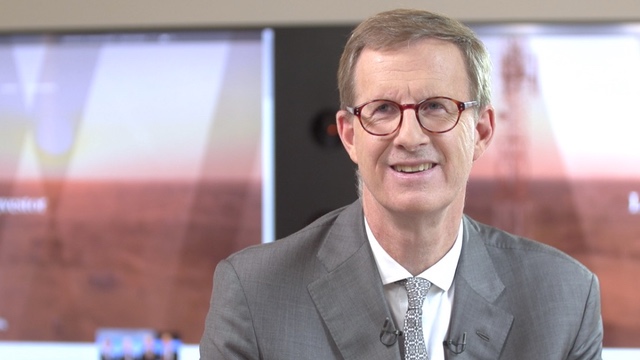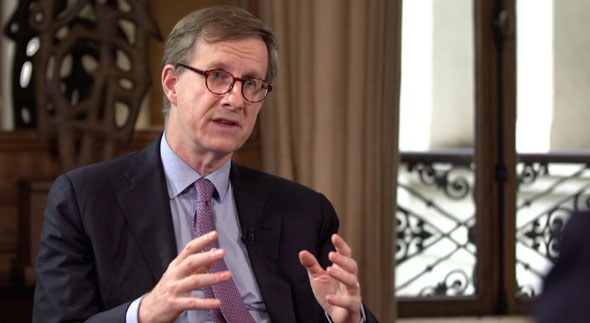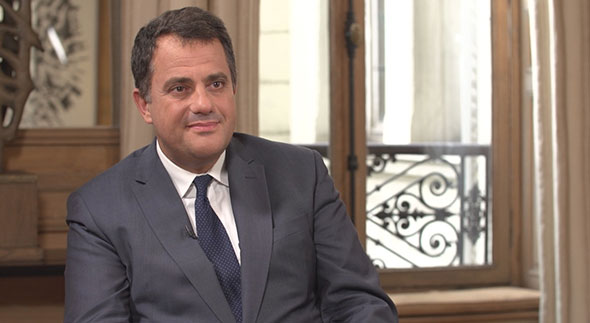Eurobusiness Media (EBM): Wendel, one of Europe’s leading listed investment firms, reports results for the first-half of 2012. Frédéric Lemoine welcome, you are the Chairman of the Executive Board of Wendel. What are your comments on your first-half results?
Frédéric Lemoine: The first-half results of Wendel have been good. We have experienced strong growth at Materis and Stahl, and global organic growth of 5.1%. However, in the building sector our companies benefitted from the rebound in the US and the continuing development in the emerging markets, but suffered from the situation in Europe, and notably in the South of Europe. We have grown our net income by more than 60% to €725 million. That’s a little bit thanks to the sale of Deutsch, our US-based company in the connector sector.
EBM: What were the highlights of the news flow from your portfolio companies during this first-half?
Frédéric Lemoine: I would mention Bureau Veritas and Materis. In Bureau Veritas, we had a very good first-half with a big event which was the arrival of a new CEO, Didier Michaud-Daniel, who joined Bureau Veritas on March 1. It was a small step for mankind but a giant leap for Bureau Veritas. It went particularly well. Didier took the reins with a lot of control and drive and charisma, and we have experienced more than 8% of organic growth and 12 external acquisitions during the first-half. As for Materis, we had also a major event during the half year with the negotiation of the restructuring of the debt. The debt has been completely restructured and postponed to the end of 2015 and 2016. It was done with 200 banks on €1.9 billion of debt, so it was a major thing to achieve and we worked particularly well together, Wendel and Materis.
EBM: The news flow regarding Bureau Veritas is indeed the arrival of the new CEO, as you said, but it’s also had a very strong rally on its share price. What should we make of that?
Frédéric Lemoine: Yes, you’re perfectly right. Bureau Veritas now represents €4 billion in our gross asset value. It’s by far the first stake in our portfolio, far ahead of Saint-Gobain. It’s amazing, but it’s a situation with which we are very comfortable because Bureau Veritas, in itself, is a very diversified business. Diversified in terms of geographies: 52% in the emerging companies, for instance. And also diversified in terms of sectors: in marines, in consumer goods, in infrastructure, in a lot of different sectors with a lot of different dynamics. So we’re very confident for the future of Bureau Veritas and for its stability in their growth and profitability patterns. And the other side of the situation is that Saint-Gobain is far behind at €2.4 billion in our gross asset value (only 28%) and, given the situation, we see a lot of potential for growing the value of Saint-Gobain in the future.
EBM: In April, you finalised the disposal of your American holding Deutsch. This allowed you to bolster your balance sheet, which was duly noted by Standard & Poor’s which upgraded your credit rating. What is your update today on your financial situation?
Frédéric Lemoine: This sale has clearly been an exceptional operation. I believe that, if in the Olympic Games we had a special event on the best deals done in 2006 (because Deutsch was bought in 2006), I hope that we could be either at the gold level or at least in the first three positions. Because it was done in very good financial conditions – we sold that company for 2.5 times the amount that was invested – but also in very good industrial terms, in very good social terms, so that was perfect. And with the €960 million of proceeds, we could repay in early repayment nearly €900 million of debt, which leads us, as you mentioned, to a very different financial situation. We have continued to reduce our gross debt by more than 55% since the beginning of 2009. We have a big amount of cash available for acquisitions, nearly €900 million as of August 21. So that is probably the reason why Standard & Poor’s took the decision of upgrading us last April.
EBM: In a few words, why did you decide to buy back shares of Wendel?
Frédéric Lemoine: You know, we have a NAV of €90.7 as of August 21, but we have experienced an increase of the discount to our NAV. So we are responsible for growing the value of the company, but the market is responsible for the price of our shares. However, when we saw a discrepancy of 40% during the first-half, and again 33.6% as of August 21, between the NAV and the share price, we believe that for our shareholders we have to take advantage of this discrepancy, so we bought back 450 thousand shares at the beginning of the year. We are ready to continue to do that and to even amplify this policy in order to cancel some shares and to increase the value for our shareholders.
EBM: Lastly, what is your strategy and your ambition regarding the evolution of your portfolio?
Frédéric Lemoine: We have reduced the number of companies run nowadays because of the sales that have been done to repay debt, so we clearly want to increase the number of companies in our portfolio. We want to do that in the non-listed areas because it’s probably our mission for our shareholders to give them access to the value creation in unlisted assets. So we’ll do that in Europe, but also in North America. The track record we have with Deutsch clearly shows that we can do that in a profitable way. That’s in two areas, Europe and the United States and Canada, where there are a lot of transactions to be available. We are looking for companies that are exposed to the global growth, and to emerging countries in particular, and we clearly want to do that in sectors where we can be long-term shareholders with our characteristic of trying to be helpful with the management of the company, working with them in developing the company for the long-term, in a position of a control or co-control shareholder which we like to have.
EBM: Frédéric Lemoine, Chairman of the Executive Board of Wendel, thank you very much.
Frédéric Lemoine: Thanks to you.





